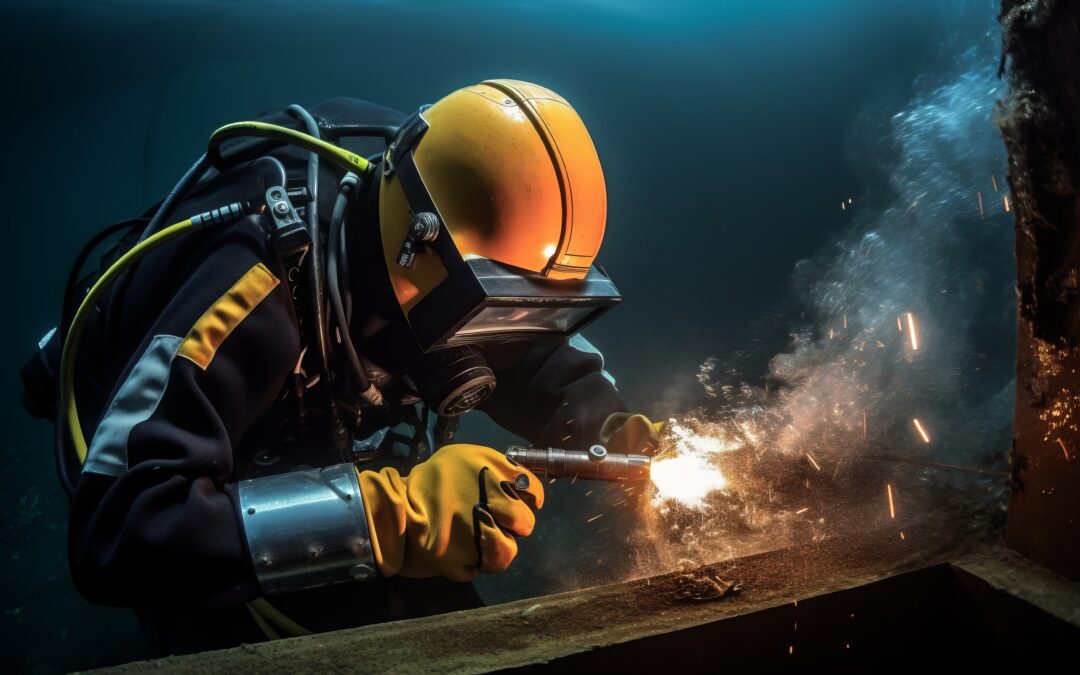Welding underwater means being in an environment where a single error could have catastrophic results. Learn about the many different injuries that are commonplace in this environment and the vital steps you should take if an accident occurs.
Why Is Underwater Welding So Dangerous?
This is a common question for people looking at this career, alongside “How dangerous is underwater welding?” In truth, this is one of the most treacherous jobs available to those with the skills to both weld and dive.
Welding itself comes with its own dangers without exacerbating that by being underwater. The complexity of working underwater, alongside the equipment used, increases the risks severely.
Some of the more common underwater welding injuries you may experience or hear about include:
Electrical Shock
The risk of electricity coming into contact with the water in the vicinity of the diver is a serious concern. Many welding accidents occur when a welder’s equipment does not have proper electrical insulation.
The possibility of electric shock leads to a risk of extreme injuries, including stopping the heart, and as such can have fatal results. For this reason, welders use equipment intended to prevent such an issue, but these dangers will never disappear.
Also, be aware of where you intend to work. As saltwater is a better conductor of electricity, this means that marine welding is even riskier than other environments.
Burn and Scald Hazards
As welding underwater still involves high levels of heat, there is always the risk of injury due to extreme temperatures. Burns can occur directly from the welding arc or due to contact with hot equipment or materials. At the same time, welding will heat the water, and as such steam or chemical burns are also a possibility.
Risk of Explosion
A mixture of gases during welding can often create an environment that is ripe for an explosion. In this situation, even a spark from welding can ignite the environment.
While welders receive training in the monitoring of gas levels and how to ventilate areas, mistakes do happen.
Decompression Sickness
Underwater jobs often present risks related to decompression. Ascending from below the water’s surface can cause what is known as “the bends,” where nitrogen bubbles build up in a person’s blood.
In small amounts, this can cause discomfort. In the most extreme cases it can cause dizziness, paralysis, or even death if left untreated.
Most welders will follow strict decompression steps, but they may often be under significant work pressure to push these limits.
Drowning Danger
Despite being skilled divers, underwater welders face many drowning-related dangers. These dangers can come about for many reasons, such as equipment failure, being trapped, or losing consciousness. The possibility of injury underwater increases this likelihood further.
Welders receive training in safety protocols to reduce these risks, but this does not guarantee the situation will lead to their use.
Hypothermia
Welders will use special equipment, including suits that offer a level of cold protection, but these cannot guarantee safety. A lack of proper training or maintenance, for example, can often lead to issues with such equipment.
Cold temperatures can quickly lead to fast problems if a diver does not take appropriate breaks, or if their body temperature is not closely monitored.
Psychological Stress
Being underwater and working in such a dangerous environment can lead to a significant amount of stress for any individual. Stress along with how isolated one can feel in such a role, can cause harm to a person long-term.
Handling the Aftermath of an Accident
Taking quick action after an accident is one of the most important things you can do to ensure the safety of everyone involved. Once the danger is mitigated, below are the steps to ensure everything is in place for future legal action.
Seek Immediate Medical Attention
During and after a situation, ensure the injured person seeks immediate help. In some cases, this may involve emergency medical services and evacuation of the injured person.
Gather Evidence and Document Everything
Once everyone is safe, make sure to collect evidence from the accident site. This may include photographs, videos, or even physical evidence of the event. If possible, ensure you have a copy of all digital records you can legally access.
Report the Accident
The accident should be reported to the appropriate authorities. This will be a legal requirement, although in some cases there may be someone else in the company whose responsibility it is to do this.
Consult a Lawyer
If you want to seek compensation, or any compensation you are offered does not seem like enough, you should consider hiring a lawyer. Such legal experts can provide you with guidance and legal help to ensure your rights are protected. Our attorneys are experienced and have access to resources to fight for the best chance of success.
Looking For Legal Help
If you have already suffered harm in such a situation, you need to know your rights are protected and that you may receive the compensation you deserve for such a high-risk role.
Here at Talbot, Carmouche & Marcello, we can help you understand what you may be owed and work with you on your case. Call us today and we will strive to secure you the justice you deserve.

